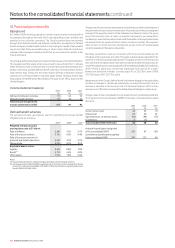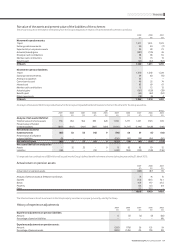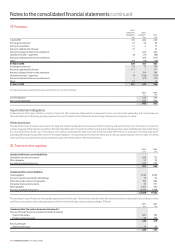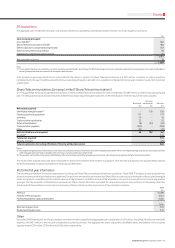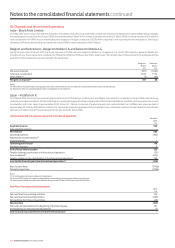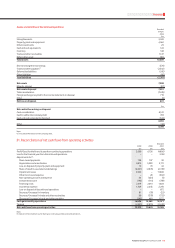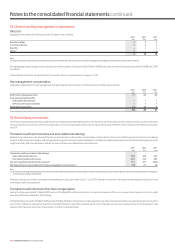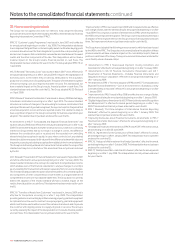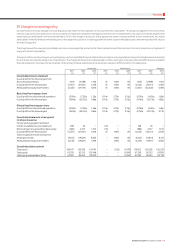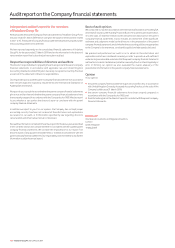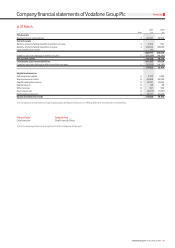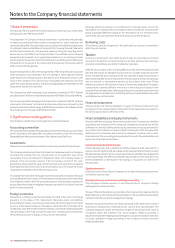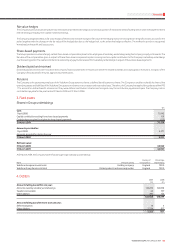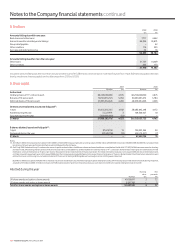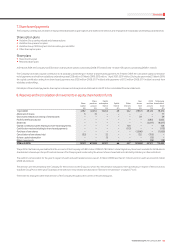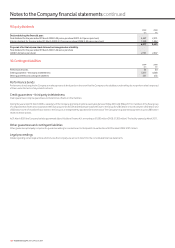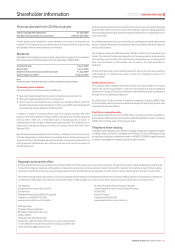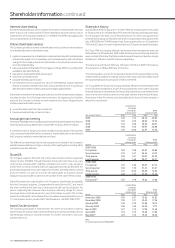Vodafone 2009 Annual Report Download - page 120
Download and view the complete annual report
Please find page 120 of the 2009 Vodafone annual report below. You can navigate through the pages in the report by either clicking on the pages listed below, or by using the keyword search tool below to find specific information within the annual report.
118 Vodafone Group Plc Annual Report 2009
Notes to the consolidated nancial statements continued
“Improvements to IFRSs” was issued in April 2009 and its requirements are effective
over a range of dates, with the earliest being for annual periods beginning on or after
1 July 2009. This comprises a number of amendments to IFRSs, which resulted from
the IASB’s annual improvements project. The Group is currently assessing the impact
of adoption of these improvements on the Group’s results, financial position and cash
flows. The improvements have not yet been endorsed for use in the EU.
The Group has not adopted the following pronouncements, which have been issued
by the IASB or the IFRIC. The Group does not currently believe the adoption of these
pronouncements will have a material impact on the consolidated results, financial
position or cash flows of the Group. These pronouncements have been endorsed for
use in the EU, unless otherwise stated.
“Amendment to IFRS 2 Share-based Payment: Vesting Conditions and •
Cancellations”, effective for annual periods beginning on or after 1 January 2009.
“Amendments to IAS 32 Financial Instruments: Presentation and IAS 1 •
Presentation of Financial Statements – Puttable Financial Instruments and
Obligations Arising on Liquidation”, effective for annual periods beginning on or
after 1 January 2009.
“Amendments to IFRS 1, “First-time adoption of IFRS and IAS 27 Consolidated and •
Separate Financial Statements – Cost of an Investment in a Subsidiary, Jointly
Controlled Entity or Associate”, effective for annual periods beginning on or after
1 January 2009.
“Improvements to IFRSs” issued in May 2008 are effective over a range of dates, •
with the earliest being for annual periods beginning on or after 1 January 2009.
“Eligible Hedged Items: Amendment to IAS 39 Financial Instruments: Recognition •
and Measurement” is effective for annual periods beginning on or after 1 July
2009. This amendment has not yet been endorsed for use in the EU.
IFRS 1 (Revised), “First-time Adoption of International Financial Reporting •
Standards”, effective for periods beginning on or after 1 January 2009. This
standard has not yet been endorsed for use in the EU.
“Improving Disclosures about Financial Instruments: Amendments to IFRS 7 •
Financial Instruments: Disclosures”, effective for annual periods beginning on or
after 1 January 2009.
“Embedded Derivatives: Amendments to IFRIC 9 and IAS 39”, effective for annual •
periods ending on or after 30 June 2009.
IFRIC 15, “Agreements for the Construction of Real Estate”, effective for annual •
periods beginning on or after 1 January 2009. This interpretation has not yet been
endorsed for use in the EU.
IFRIC 16, “Hedges of a Net Investment in a Foreign Operation”, effective for annual •
periods beginning on or after 1 October 2008. This interpretation has not yet been
endorsed for use in the EU.
IFRIC 17, “Distributions of Non-cash Assets to Owners”, effective for annual periods •
beginning on or after 1 July 2009. This interpretation has not yet been endorsed
for use in the EU.
38. New accounting standards
The Group has not applied and does not intend to early adopt the following
pronouncements, which have been issued by the IASB or the International Financial
Reporting Interpretations Committee (‘IFRIC’).
IFRIC 13 “Customer Loyalty Programmes” was issued in June 2007 and is effective
for annual periods beginning on or after 1 July 2008. The interpretation addresses
how companies that grant their customers loyalty award credits when buying goods
or services should account for their obligations to provide free or discounted goods
and services. It requires that consideration received be allocated between the award
credits and the other components of the sale. This interpretation will not have a
material impact on the Group’s results, financial position or cash flows. This
interpretation has been endorsed for use in the EU. The Group adopted IFRIC 13 on
1 April 2009.
IAS 23 (Revised) “Borrowing Costs” was issued in March 2007 and is effective for
annual periods beginning on or after 1 January 2009. It requires the capitalisation of
borrowing costs, to the extent they are directly attributable to the acquisition,
production or construction of a qualifying asset. The option of immediate recognition
of those borrowing costs as an expense has been removed. This standard will not
have a material impact on the Group’s results, financial position or cash flows. This
standard has been endorsed for use in the EU. The Group adopted IAS 23 (Revised)
on 1 April 2009.
IFRS 3 (Revised) “Business Combinations” was issued in January 2008 and will apply
to business combinations occurring on or after 1 April 2010. The revised standard
introduces a number of changes in the accounting for business combinations that
will impact the amount of goodwill recognised, the reported results in the period that
a business acquisition occurs and future reported results. This standard is likely to
have a significant impact on the Group’s accounting for business acquisitions post
adoption. This standard has not yet been endorsed for use in the EU.
An amendment to IAS 27 “Consolidated and Separate Financial Statements” was
issued in January 2008 and is effective for annual periods beginning on or after 1 July
2009. The amendment requires that when a transaction occurs with non-controlling
interests in Group entities that do not result in a change in control, the difference
between the consideration paid or received and the recorded non-controlling
interest should be recognised in equity. In cases where control is lost, any retained
interest should be remeasured to fair value with the difference between fair value and
the previous carrying value being recognised immediately in the income statement.
The Group has historically entered into transactions that are within the scope of this
standard and may do so in the future. This amendment has not yet been endorsed
by the EU.
IAS 1 (Revised) “Presentation of Financial Statements” was issued in September 2007
and will be effective for annual periods beginning on or after 1 January 2009. The
revised standard introduces the concept of a statement of comprehensive income,
which enables users of the financial statements to analyse changes in an entity’s
equity resulting from transactions with owners separately from non-owner changes.
The revised standard provides the option of presenting items of income and expense
and components of other comprehensive income either as a single statement of
comprehensive income or in two separate statements. The Group does not currently
believe the adoption of this revised standard will have a material impact on the
results, financial position or cash flows. This statement has been endorsed for use in
the EU.
IFRIC 18 “Transfers of Assets from Customers” was issued in January 2009 and is
effective for transactions occurring on or after 1 July 2009. The interpretation
provides guidance on accounting by entities receiving property, plant and equipment
(or cash which must be used to construct or acquire property, plant and equipment)
which must then be used to either connect the customer to a network and/or provide
the customer with ongoing access to a supply of goods or services. The Group is
currently assessing the impact of the interpretation on it’s results, financial position
and cash flows. This interpretation has not yet been endorsed for use in the EU.


